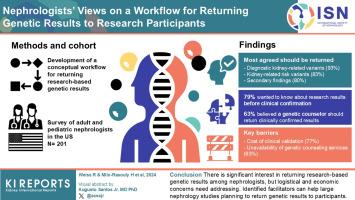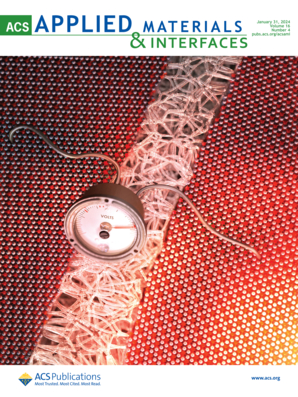Nephrologists’ Views on a Workflow for Returning Genetic Results to Research Participants
IF 8.3
2区 材料科学
Q1 MATERIALS SCIENCE, MULTIDISCIPLINARY
引用次数: 0
Abstract
Introduction
Returning research-based genetic results (gRoR) to participants in nephrology research can improve care; however, the practice raises implementational questions and no established guidelines for this process currently exist. Nephrologists' views on this issue can inform the process but are understudied.
Methods
We developed a conceptual workflow for gRoR from literature and experience, covering aspects such as which results to return, how, and by whom. We surveyed US nephrologists to gauge their views on the workflow and anticipated barriers and collected participants' demographics, including professional backgrounds.
Results
A total of 201 adult and pediatric nephrologists completed the survey. Most of them agreed that all diagnostic kidney-related results (93%), secondary findings (80%), and kidney-related risk variants (83%) should be returned. No significant differences were found between adult and pediatric nephrologists’ responses, except that 48% of adult nephrologists versus 26% of pediatric nephrologists supported returning polygenic risk scores (PRS) (P < 0.01). Seventy-nine percent wanted to know about research results before clinical confirmation. Most of them (63%) believed a genetic counselor should return clinically confirmed results. Key barriers included the cost of clinical validation (77%) and the unavailability of genetic counseling services (63%). Facilitators included educational resources on genetic kidney diseases (91%), a referral list of experts (89%), and clear clinical care guidelines (89%). We discuss findings’ implications and provide “points to consider.”
Conclusion
There is significant interest in gRoR among nephrologists; however, logistical and economic concerns need addressing. Identified facilitators can help large nephrology studies planning to return genetic results to participants.

肾脏病学家对向研究参与者返还基因结果的工作流程的看法
将基于研究的基因结果(gRoR)返还给肾脏病学研究的参与者可以改善护理工作;但是,这种做法在实施过程中会产生一些问题,而且目前还没有关于这一过程的既定指南。肾脏病学家对这一问题的看法可以为这一流程提供参考,但对这一流程的研究还不够。我们根据文献和经验制定了 gRoR 概念性工作流程,包括哪些结果需要返回、如何返回以及由谁返回等方面。我们调查了美国的肾科医生,以了解他们对工作流程和预期障碍的看法,并收集了参与者的人口统计数据,包括专业背景。共有 201 名成人和儿科肾病专家完成了调查。他们中的大多数人都认为,所有与肾脏相关的诊断结果(93%)、辅助检查结果(80%)和与肾脏相关的风险变异(83%)都应该返回。除了 48% 的成人肾脏病学家和 26% 的儿科肾脏病学家支持返还多基因风险评分 (PRS) 外,成人肾脏病学家和儿科肾脏病学家的回答无明显差异(< 0.01)。79%的人希望在临床确认之前了解研究结果。他们中的大多数(63%)认为遗传咨询师应返回临床确认的结果。主要障碍包括临床确认的费用(77%)和遗传咨询服务的不可获得性(63%)。促进因素包括遗传性肾脏疾病的教育资源(91%)、专家转介名单(89%)和明确的临床护理指南(89%)。我们讨论了研究结果的意义,并提供了 "考虑要点"。肾脏病学家对遗传性肾脏病有浓厚的兴趣,但需要解决后勤和经济方面的问题。确定的促进因素可以帮助计划将基因结果返还给参与者的大型肾脏病研究。
本文章由计算机程序翻译,如有差异,请以英文原文为准。
求助全文
约1分钟内获得全文
求助全文
来源期刊

ACS Applied Materials & Interfaces
工程技术-材料科学:综合
CiteScore
16.00
自引率
6.30%
发文量
4978
审稿时长
1.8 months
期刊介绍:
ACS Applied Materials & Interfaces is a leading interdisciplinary journal that brings together chemists, engineers, physicists, and biologists to explore the development and utilization of newly-discovered materials and interfacial processes for specific applications. Our journal has experienced remarkable growth since its establishment in 2009, both in terms of the number of articles published and the impact of the research showcased. We are proud to foster a truly global community, with the majority of published articles originating from outside the United States, reflecting the rapid growth of applied research worldwide.
 求助内容:
求助内容: 应助结果提醒方式:
应助结果提醒方式:


